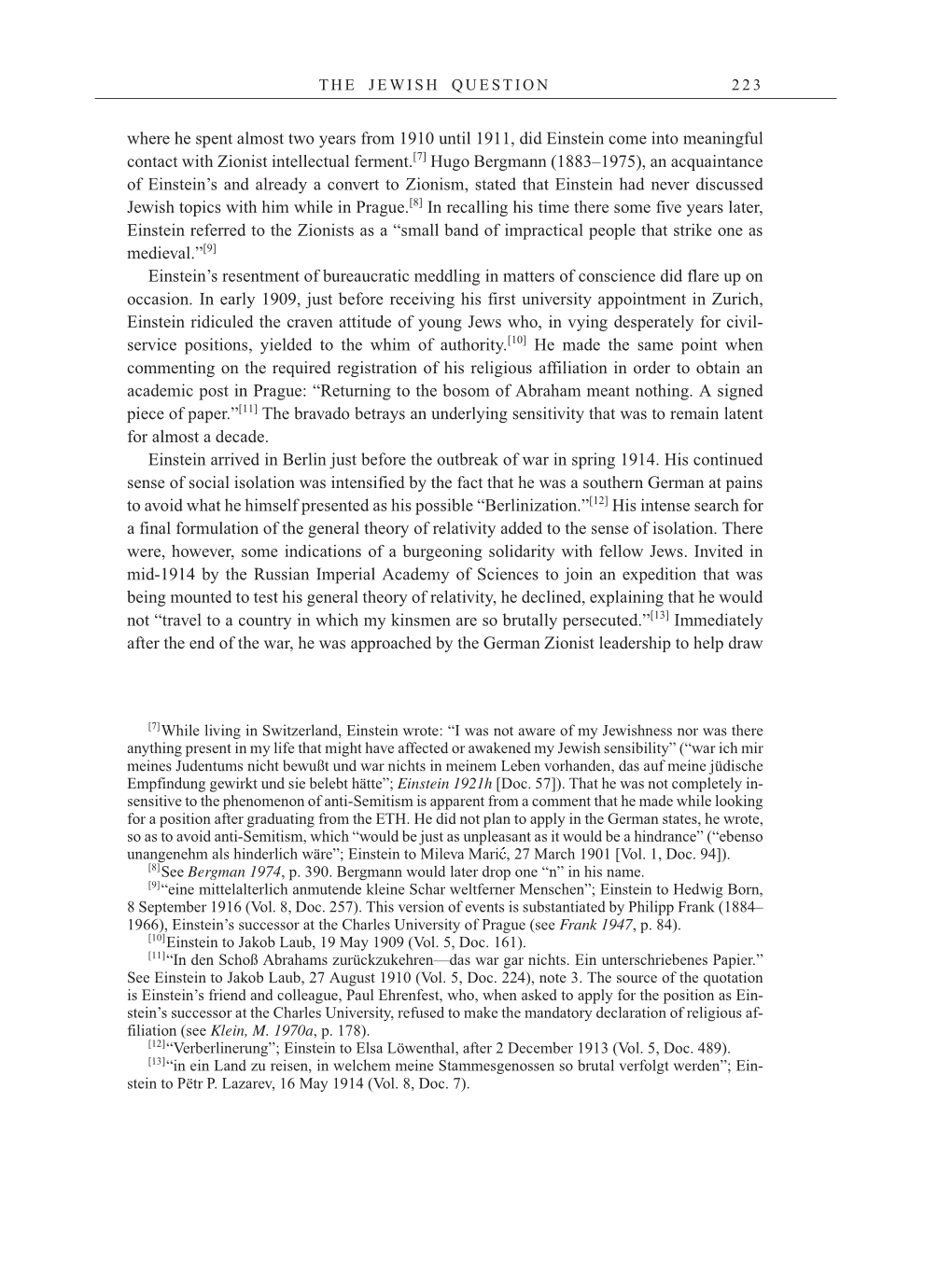T H E J E W I S H QU E S T I O N 2 2 3
where he spent almost two years from 1910 until 1911, did Einstein come into meaningful
contact with Zionist intellectual
ferment.[7]
Hugo Bergmann (1883–1975), an acquaintance
of Einstein’s and already a convert to Zionism, stated that Einstein had never discussed
Jewish topics with him while in
Prague.[8]
In recalling his time there some five years later,
Einstein referred to the Zionists as a “small band of impractical people that strike one as
medieval.”[9]
Einstein’s resentment of bureaucratic meddling in matters of conscience did flare up on
occasion. In early 1909, just before receiving his first university appointment in Zurich,
Einstein ridiculed the craven attitude of young Jews who, in vying desperately for civil-
service positions, yielded to the whim of
authority.[10]
He made the same point when
commenting on the required registration of his religious affiliation in order to obtain an
academic post in Prague: “Returning to the bosom of Abraham meant nothing. A signed
piece of
paper.”[11]
The bravado betrays an underlying sensitivity that was to remain latent
for almost a decade.
Einstein arrived in Berlin just before the outbreak of war in spring 1914. His continued
sense of social isolation was intensified by the fact that he was a southern German at pains
to avoid what he himself presented as his possible
“Berlinization.”[12]
His intense search for
a final formulation of the general theory of relativity added to the sense of isolation. There
were, however, some indications of a burgeoning solidarity with fellow Jews. Invited in
mid-1914 by the Russian Imperial Academy of Sciences to join an expedition that was
being mounted to test his general theory of relativity, he declined, explaining that he would
not “travel to a country in which my kinsmen are so brutally
persecuted.”[13]
Immediately
after the end of the war, he was approached by the German Zionist leadership to help draw
[7]While living in Switzerland, Einstein wrote: “I was not aware of my Jewishness nor was there
anything present in my life that might have affected or awakened my Jewish sensibility” (“war ich mir
meines Judentums nicht bewußt und war nichts in meinem Leben vorhanden, das auf meine jüdische
Empfindung gewirkt und sie belebt hätte”; Einstein 1921h [Doc. 57]). That he was not completely in-
sensitive to the phenomenon of anti-Semitism is apparent from a comment that he made while looking
for a position after graduating from the ETH. He did not plan to apply in the German states, he wrote,
so as to avoid anti-Semitism, which “would be just as unpleasant as it would be a hindrance” (“ebenso
unangenehm als hinderlich wäre”; Einstein to Mileva Mari , 27 March 1901 [Vol. 1, Doc. 94]).
[8]See Bergman 1974, p. 390. Bergmann would later drop one “n” in his name.
[9]“eine mittelalterlich anmutende kleine Schar weltferner Menschen”; Einstein to Hedwig Born,
8 September 1916 (Vol. 8, Doc. 257). This version of events is substantiated by Philipp Frank (1884–
1966), Einstein’s successor at the Charles University of Prague (see Frank 1947, p. 84).
[10]Einstein to Jakob Laub, 19 May 1909 (Vol. 5, Doc. 161).
[11]“In den Schoß Abrahams zurückzukehren—das war gar nichts. Ein unterschriebenes Papier.”
See Einstein to Jakob Laub, 27 August 1910 (Vol. 5, Doc. 224), note 3. The source of the quotation
is Einstein’s friend and colleague, Paul Ehrenfest, who, when asked to apply for the position as Ein-
stein’s successor at the Charles University, refused to make the mandatory declaration of religious af-
filiation (see Klein, M. 1970a, p. 178).
[12]“Verberlinerung”; Einstein to Elsa Löwenthal, after 2 December 1913 (Vol. 5, Doc. 489).
[13]“in ein Land zu reisen, in welchem meine Stammesgenossen so brutal verfolgt werden”; Ein-
stein to Pëtr P. Lazarev, 16 May 1914 (Vol. 8, Doc. 7).
